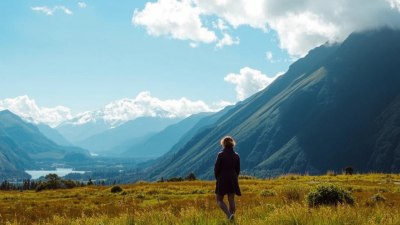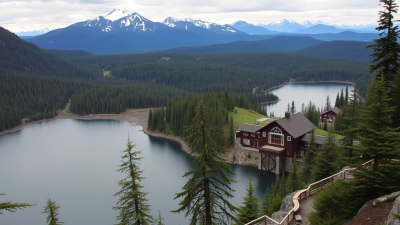How to Stay Safe While Traveling Completely Off the Grid
Essential tips for staying safe while exploring off-grid travel destinations.

Image by pvproductions on Freepik
Traveling off the grid can be an exhilarating experience, providing you with a chance to connect with nature, escape from modern conveniences, and challenge your survival skills. However, it's crucial to prioritize safety while embarking on such adventures. This article delves into various strategies and tips to ensure your safety while exploring remote destinations away from traditional travel routes.
Preparation is Key
Before setting off on your off-grid adventure, thorough preparation is essential. Research your destination thoroughly, including climate conditions, wildlife encounters, and available resources. Create a detailed itinerary, but remain flexible to adapt to changes that may arise. Ensure you have a reliable map and compass or a GPS device that works offline, as internet access may be nonexistent.
Also, inform someone reliable about your travel plans. Share your itinerary, emergency contacts, and the expected duration of your trip. This way, if something goes wrong, someone will know where to look for you.
Choose Appropriate Gear
Your choice of gear can significantly impact your safety while off the grid. Invest in high-quality camping equipment, including a durable tent, a sleeping bag, and waterproof clothing. The right footwear is also important; choose sturdy boots that provide ankle support and traction on various terrains.
Other essential items include a first aid kit, a portable water filter, a multi-tool, and non-perishable food supplies. A portable charger for your devices can be invaluable, even off the grid, for emergencies. Before heading out, make sure all your gear is in good working condition, and familiarize yourself with its use.
Emergency Communication
Emergencies can happen anywhere, especially in remote areas. Thus, having a reliable method of communication is essential. While cell phones may not work in the wilderness, consider investing in a satellite phone or a personal locator beacon (PLB). These devices allow you to communicate your location in case of emergencies even in areas without cellular coverage.
Additionally, familiarizing yourself with basic survival skills can be life-saving. Know how to build a fire, purify water, administer first aid, and navigate using natural signs. Being well-versed in survival tactics will boost your confidence and improve your chances of staying safe.
Travel in a Group
Whenever possible, travel with a group when exploring off-grid areas. There’s safety in numbers, and having companions can provide assistance in emergency situations. Group travel allows individuals to share responsibilities, such as navigation and cooking, resulting in better resource management.
A group can offer diverse skills, making it easier to deal with potential dangers. When traveling with multiple people, establish specific roles within the group to enhance safety and efficiency. Coordination can significantly improve your group’s ability to address unforeseen challenges.
Stay Aware of Your Surroundings
Maintain awareness of your physical limits and respect them. Overexerting yourself increases the risk of injury or accidents. While pushing your boundaries can be rewarding, knowing when to slow down or rest is equally important.
Water and Food Safety
Access to clean water is one of the most important factors of safety while off the grid. Always carry a portable water filter or purification tablets. Avoid drinking water directly from streams or lakes unless you have filtered it first. Learn how to identify safe and edible plants or berries, but also understand that some can be poisonous. Always err on the side of caution.
Prioritize high-energy food options, like energy bars, nuts, and dehydrated meals, which are lightweight and easy to prepare. Always carry enough food and supplies for your trip’s duration, with some extra rations in case of delays.
Navigational Tools
Navigation can be challenging in unmarked wilderness areas. While GPS devices are beneficial, they may fail due to battery life or lack of service. Physical navigation tools like maps and compasses should be your primary systems. Learning how to read a topographic map can prove invaluable when traversing complicated terrain.
Practice your navigation skills before departure, and ensure you can orient yourself without relying solely on technology. Regularly check your chosen route against your map to maintain awareness of your location.
Emergency Shelter Options
Sometimes danger can arise unexpectedly, hence knowing about emergency shelters is crucial. Carry a lightweight emergency blanket or tarp that can serve as a quick shelter in times of need. Additionally, familiarize yourself with building temporary shelters using natural materials like leaves, branches, and mud.
Learning various shelter-building techniques can safeguard you against severe weather, exposure, or animal threats. In situations where your primary tent or sleeping apparatus fails, having the ability to construct makeshift shelters can make all the difference.
Animal Encounters
When traveling in remote areas, you may encounter wildlife. Understanding animal behavior and avoiding risky encounters is vital. Keep a safe distance from wild animals, as getting too close can provoke them. Familiarize yourself with what to do in case of an encounter with dangerous animals like bears or snakes, as different species may require different responses.
Another important tip is to store food properly. Ensuring that your food is secured and away from your sleeping area can help prevent wildlife encounters during the night. Use bear-proof containers or hang food in trees where animals cannot reach.
First Aid Knowledge
Being able to administer first aid is vital for off-grid adventures. Pack a well-stocked first aid kit and learn how to treat common injuries, such as cuts, scrapes, sprains, and insect bites. Being able to respond quickly to an injury can prevent minor accidents from escalating into serious emergencies.
Take time to learn basic first aid techniques before your trip, and consider enrolling in a first aid certification course. Knowing how to respond in emergencies can give you confidence and significantly increase your chances of staying safe.
Recap and Final Thoughts
Traveling off the grid can be one of the most rewarding experiences of your life, offering unique opportunities to explore the great outdoors. By prioritizing your safety through thorough preparation, appropriate gear, effective communication, and knowledge of your environment, you can mitigate risks and fully enjoy your adventure. Whether you're trekking through dense forests or climbing rugged mountains, remember the importance of respecting nature and remaining cautious. Embrace the wilderness responsibly, plan wisely, and stay safe.











